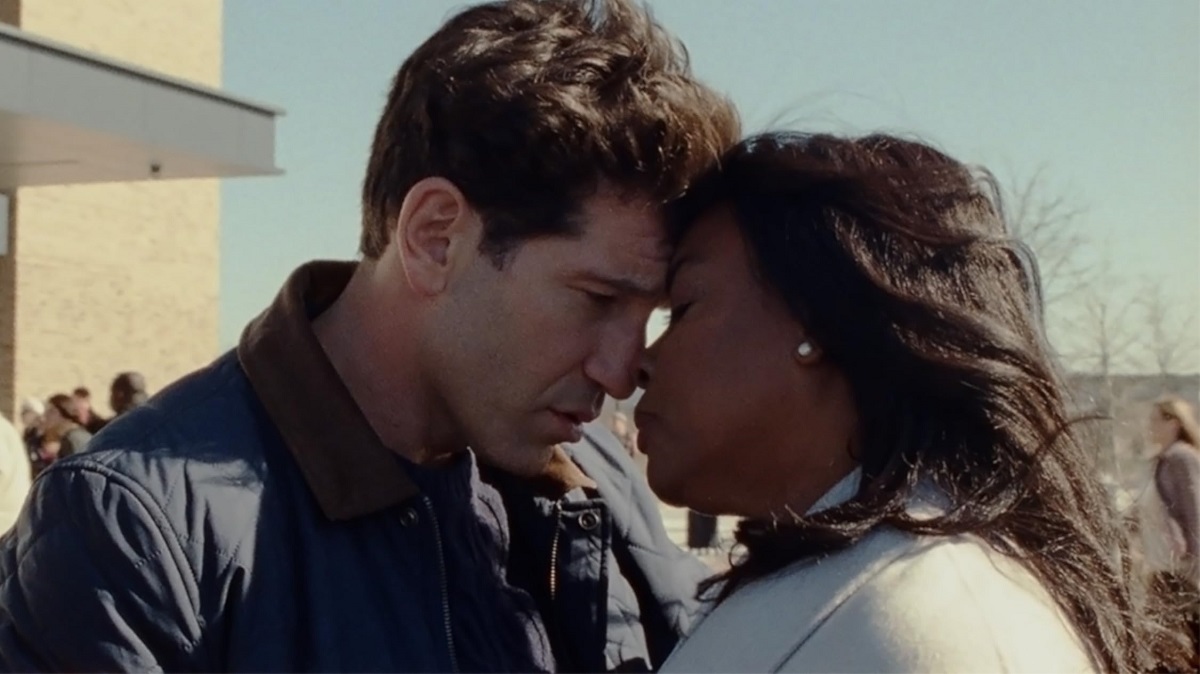
There’s an ambition within Origin that is admirable and keeps this film grounded in its goals. Fluctuating between a true-story drama and historical exploration, the desire for answers and to make sense of this world’s wrongs is something that becomes incredibly relatable. As much as a movie like this meanders around so many angles of race and caste, it maintains an emotional core of finding what matters most.
Based on the non-fiction book Caste: The Origins of Our Discontents, the film centers around writer Isabel Wilkerson (Aunjanue Ellis-Taylor). She shared a portion of her life with her kind husband, Brett (Jon Bernthal), a man who always seemed to be there for her and knew just what to say. When topics of racism in America became a bubbling debate while watching TV with her mother (Emily Yancy), Brett was there to listen and sometimes speak earnestly. This relationship came to a tragic end in 2015 when he died, as warm visions of their time together still haunt her in quiet moments.
Dismayed by this tragedy and the rising racial tensions, Isabel decides to write a book on the nature of oppression. She believes there may be something more to this oppression and that it may have a correlation with the caste system. To understand this further, beyond reading a few books on the topic, she sets off on a journey across the globe to speak with those with more experience. Everything from the persecution of Jews amid the Holocaust to the caste systems of India. Her research continues onward for long stretches, where she ends up losing family members along the way to illnesses.
What makes Isabel’s journey so fascinating is that her hypothesis is not without challenge. Her assertions of trying to tie race to caste are not entirely founded, and those she interviewed don’t exactly touch on any newfound revelation that would prove such a theory. But we desire to understand history and place ourselves in these historical moments to understand the oppression better. In one of the most fantastical yet tearful moments, Isabel is told the story of a black boy who was denied entry to a pool while all the other kids were let inside. Isabel imagines herself in that place in time, having an intimate conversation with the boy about how he is loved and everything will be okay.
The assembly of this film is unique as it doesn’t become entirely a biopic of Isabel’s research nor a reading of her text in the form of a documentary. Isabel never remains all that distant and often steers the conversations by highlighting race and caste, as in the illuminating conversation she has with her cousin (Niecy Nash). There are many moments like this that feel more real than melodrama, making the drive for this book something more than a means of coping with loss.
Director Ava DuVernay does a masterful job of making Origin just as illuminating as the book it’s based on, weaving personal tragedy and caste/race research. There’s a sobering conclusion in how Isabel does not find a synonym relation between race and caste but that they co-exist and often reinforce each other. If not examined and left unchecked, the two forces of oppression could easily become bedfellows in making the world worse (“Caste is the bones, race the skin”). The desire to understand this makes life seem more compelling to explore for all its beautiful moments of tenderness and its somber times of loss. Through it all, DuVernay’s film is a contemplative meditation on how we interact with the world and mostly appeals to that innate sense of questing for knowledge.

 “My Spy: The Eternal City” Review
“My Spy: The Eternal City” Review  “Deadpool & Wolverine” Review
“Deadpool & Wolverine” Review  “The Boys: Season Four” Review
“The Boys: Season Four” Review  “The American Society of Magical Negroes” Review
“The American Society of Magical Negroes” Review  “Twisters” Review
“Twisters” Review  “Sausage Party: Foodtopia” Review
“Sausage Party: Foodtopia” Review  “Robot Dreams” Review
“Robot Dreams” Review  “Godzilla x Kong: The New Empire” Review
“Godzilla x Kong: The New Empire” Review 


